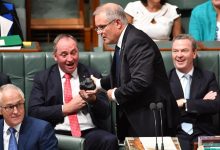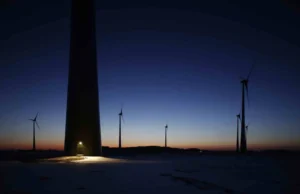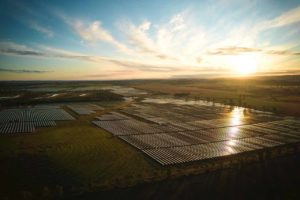It was no lump-of-coal-in-parliament moment, but Scott Morrison threw himself – and his Liberal National Party Coalition – back on to the coal power bandwagon over the weekend, and rode it straight to the heart of Queensland coal country.
Three weeks out from the federal election, Morrison paid a visit to Ken O’Dowd, the LNP’s federal member for Flynn, which as his website points out is a seat in Queensland that takes in an area around twice the size of Tasmania.
Gladstone – which hosts O’Dowd’s HQ – has been a coal centre of Australia; home to the world’s fourth largest coal exporting port and an ageing 1,680MW coal-fired power station; and the subject of a promised (and controversial) feasibility study for a new coal plant.
But as we have noted on RenewEconomy on various occasions, it is also rapidly becoming a centre for the transition to renewables, including plans for two major solar farms, trials of tidal energy at the port, and plans for a solar and hydrogen powered abattoir.
These projects were not on Morrison’s radar, though, with O’Dowd – whose election campaign slogan is “Ken stands for coal” – instead taking his boss on a visit to “world-beating coal industry-related manufacturer AusProof.”
Asked, inevitably, by the accompanying media scrum whether he also “stood for coal,” Morrison said “yes.”
“55,000 jobs depend on our coal mining industry. That’s what it does and I think that’s great for Australia,” he said.
“And it will continue to play an important role in Australia.”
Morrison’s support for coal is, of course, no surprise. But this latest declaration comes at an interesting time in the election race, with the latest Newspoll showing a tightening of the gap between Labor and the Coalition, putting ALP ahead by 49-51 per cent, compared with 48-52 per cent a fortnight ago.
It was quickly echoed by similar declarations from both Pauline Hanson’s One Nation and Clive Palmer’s United Australia Party, who both found themselves in the central Queensland coal mining town of Clermont in time for the arrival of anti Adani coal mine protesters, led by former Greens leader Bob Brown.
In speeches to pro-coal demonstrations in the town on the weekend, One Nation’s Hanson described the issue as “very political” – “because it depends on which politicians you put into parliament whether coal mining goes ahead,” she said.
Clive Palmer was a bit less transparent, telling pro-Adani supporters that his United Australia Party was “happy to support anything that we can sell on the market to the world that can create jobs for Australia.”
Last week is was revealed that the Coalition would preference the mining magnate’s Party candidates in a deal that is hoped to give the LNP a better shot at marginal Queensland seats, and give Palmer a better shot at the Senate.
Hanson has shown her own brand of support for the LNP – and coal – by putting Labor last on One Nation how-to-vote cards in four critical seats. The Nationals are also putting One Nation ahead of Labor in Queensland.
“Bill Shorten and Labor have made it very clear that the majority of their elected members want to shut down of our coal industry in Queensland and NSW which will leave tens of thousands of workers out of jobs,” she said, in explanation of her decision.
But is latching on to coal the right move for the Coalition? In the recent New South Wales election – as Giles Parkinson reported here – coal became a dirty word for the duration of the campaign that returned the Gladys Berejiklian Coalition government for another four-year term.
As it turned out, the biggest losers in that state poll were the Nationals – the one party that did not remain quiet about coal in the lead-up to the election, and in whose electorates climate is already having a tangible impact.
As has become increasingly obvious, if not through voter surveys then from the actual outcomes of recent state and by-election contests around the country, climate change is a major voter issue.
And yet the Coalition seems willing to stay in a continued state of political denial on the subject, and at the bottom of the class on policies.
Indeed, an Australian Conservation Foundation report card published on Monday marked the Coalition’s climate policies – including its plans for renewables, plans to phase out coal, and protection of the natural environment — a 4/100.
In the same report, which assessed Australia’s major parties’ policies on 50 key markers across four broad areas gave Labor 56/100, and the Greens 99/100.
“Stopping climate change and protecting nature are top issues for Australians at this election, according to numerous opinion polls and theABC’s Vote Compass,” said ACF CEO Kelly O’Shanassy.
“Australians are already being hurt by climate damage and they want to be represented by politicians who take the issue seriously and will act with urgency.
“The Coalition’s signature climate policy – the emissions reduction fund – has not curbed Australia’s climate pollution. For the Coalition to again offer this ineffective policy as its main plan to tackle climate change shows a disregard for farmers, survivors of natural disasters fuelled by global warming and the next generation of Australians.
“Of the two major parties, Labor is miles ahead of the Coalition on climate commitments, but neither party is doing enough to make Australians safe from climate damage,” O’Shanassy said.
“The policies the Greens are taking to the election reflect the urgency of action scientific bodies like the Intergovernmental Panel on Climate Change say is needed to keep global warming at relatively safe levels.”










